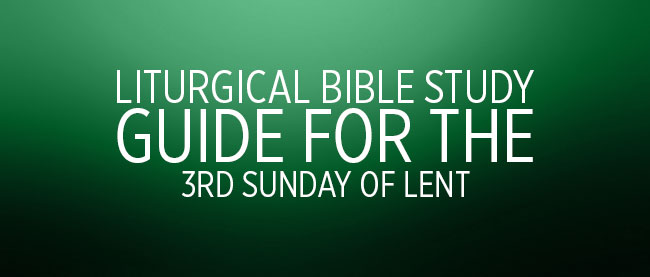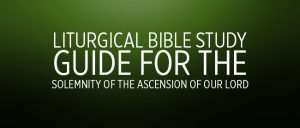1st Reading – Exodus 17:3-7
The Book of Exodus (Greek for “going out”) relates the oppression of the Israelites in Egypt; the birth and education of Moses and his flight into the land of Midian; the appearance of God to Moses at Mount Sinai (Horeb); revelation of the sacred name of Yahweh (I AM), and the commissioning of Moses and Aaron to deliver the Israelites from bondage; the return of Moses to Egypt, and his vain appeal to Pharaoh to let Israel to go free; the first nine plagues (blood, frogs, gnats, flies, on livestock, boils, hail, locusts, and darkness); the institution of the Passover meal and the 10th plague (on the firstborn), and Israel’s departure from Egypt, the crossing of the Red Sea, the death of the pursuing Egyptians, the Song of Triumph, the manna, and other incidents of the journey through the wilderness; the sojourn at Mount Sinai and the giving of the Law, including the 10 commandments and the book of the covenant; directions for the building of the tabernacle and the consecration of Aaron and the priests; the falling away of the people from Yahweh and the worshiping of the golden calf; the prayer of Moses for the people and their return to God’s favor; the construction of the tabernacle and its furniture.
Unfortunately, the author does not name the Pharaoh or Pharaohs under whom the events in Egypt transpired. 1 Kings 6:1 says that it was 480 years from the Exodus to Solomon’s temple. Since Solomon ascended to the throne in 960 B.C., the exodus would have been about 1440 B.C. This would place the events in the 15th century, but archaeological evidence points to a 13th century date. If one takes the 1st Kings 480 years to be a round number indicating 12 generations, a 13th century date is possible; in fact, 1280 is suggested by archaeological evidence (Rameses II was pharaoh from 1292-1225 B.C.). Tradition has Moses as the author.
Today’s reading describes events which took place just before the Israelites arrived at Mount Sinai. Since they arrived at Mount Sinai three months after they left Egypt, this is very early in the Exodus; but after the manna and the quail. From the wilderness of Sin the Israelites moved on to Rephidim which most scholars today locate in the Wadi Refayid, some 30 miles from Mount Sinai.
2nd Reading – Romans 5:1-2, 5-8
The letter to the Romans was written by Paul during his third missionary journey (A.D. 55- 56). It was probably written from Corinth. Paul’s background was that of a Hebrew pharisee, and thus schooled in the concept of family covenant rather than in the Roman court as so many today try to assert. We must always be careful to interpret Scripture through the eyes and understanding of the sacred writer.
Gospel – John 4:5-42
This event happened very early in Jesus’ public ministry: immediately after His baptism, the wedding feast at Cana, and His encounter with Nicodemus, all of which have baptismal significance.





